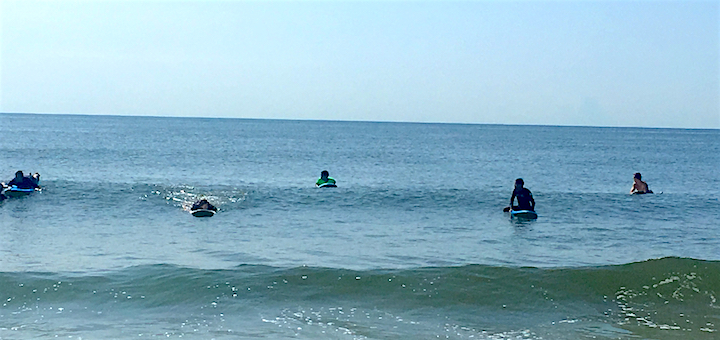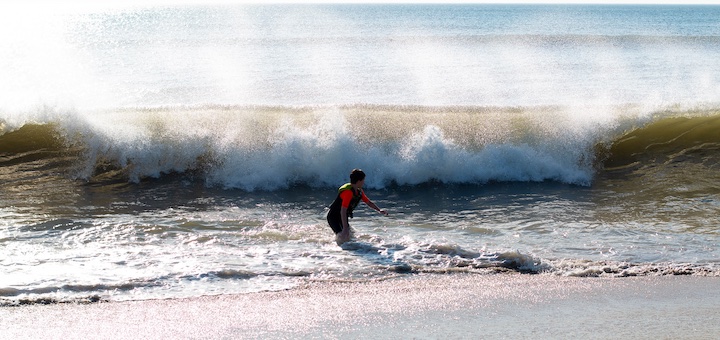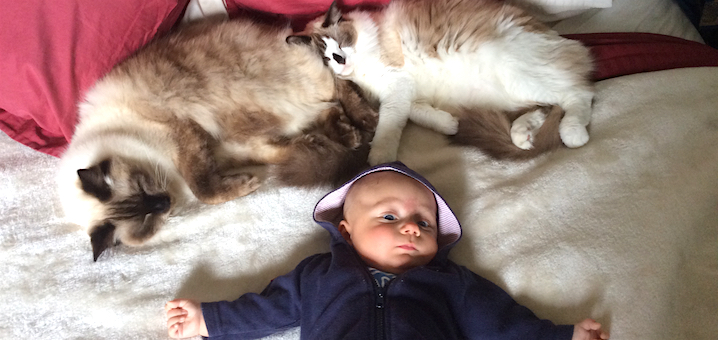
We love getting emails from readers here at Frugalwoods HQ and were intrigued recently by reader Jeff’s question as to what he and his wife should do with a $250,000 windfall they’ll soon receive. A good problem to have! Other than swim in it, buy treats for Frugal Hound, or shove it under a mattress (none of which we would actually advise), what’s a person with an unexpected lump sum to do?
I want to put this one to the Frugalwoods readership and ask you all to weigh in on Jeff’s quandary. But first, let’s hear from Jeff himself.
Jeff wrote in:
I’m 30, married, and have two little kids (both under 5) at home. I’m currently employed as a professional in a fairly comfortable job and my wife stays home. Over the past few years, we’ve been working feverishly at paying off substantial debt from my grad school education (six-figures and then some).
Fortunately, I make a pretty good salary, due in large part to my expensive degree, so we were able to hack away at it pretty quickly. Now, there is finally light at the end of the tunnel! We expect to pay off the last chunk of debt within the next few months. It’s been a long, hard journey but we’re glad to be almost done.
There is an even brighter light at the end of the tunnel, though. Through a series of fortunate circumstances, we’ll be coming into a pretty large chunk of cash within the next year – to the tune of around $250,000, taxes-paid. Our question now is: what should we do with it?
We own a home (with a mortgage still), our cars, and have no debt other than mortgage. We have some paltry retirement savings, but not much else. So, obviously, we’ll max out our retirement accounts for the year and keep enough cash handy to max them out for the following year. After that’s done, though, we’ll still have a fair bit left over. What should we do with the remainder?
I’ve always fancied the idea of becoming a landlord and would love to own rental property, but that aspiration is countered by my aversion to taking on any more debt. Should I pursue that? Any other ideas?
An interesting dilemma to be sure. I applaud Jeff and his wife for paying off Jeff’s hefty six-figure graduate school debt, that’s no small feat! A number of follow-up questions immediately sprang to mind after I read his initial email and Jeff was kind enough to indulge me with his answers:
Mrs. FW: First and foremost, what’s your overall goal? And the timeline for that goal? Do you hope to retire early? Or something else?
Jeff: I think my overall goal is financial security for my family. Obviously there’s no timeline for that since it’s ongoing, but each paycheck brings it closer in my mind. I’m not sure that I want to retire early or that I’ll even be able to do that, but I would like to be more free to pursue a few business ventures that I’ve got in my mind. That being said, I’m a bit of a fraidy cat when it comes to pursuing my business ideas. My conservative, spend-no-money side always seems to win out over my risk-taking, entrepreneurial side.

Mrs. FW: Regarding the idea of you becoming a landlord: Are you handy with DIY projects and home renovation-type work?
Jeff: Not in the least. Haha. That could be a problem. However, I’m a pretty quick learner and think I could pick up handyman skills with some practice.
Mrs. FW: Where in the United States do you live?
Jeff: The Midwest. Unfortunately, real estate and rental prices in my area aren’t great for a buy/rent-out strategy. It’s very tough to meet the 1% rule.
Mrs. FW: What’s your tolerance for financial risk?
Jeff: Low, although I think that’s more the influence of my better half and the fact that I’m a father. If I were single, I’d have a much higher appetite.
Mrs. FW: What’s your annual salary? Do you get a 401K match?
Jeff: Annual salary is roughly $125,000. No 401k match 🙁
Mrs. FW: What are your annual expenses?
Jeff: Higher than they should be at around $40,000-$45,000.
Mrs. FW: What are your after-tax liquid assets (checking, savings account, brokerage account)?
Jeff: Liquid of about $25,000.
Mrs. FW: What are your retirement assets (401K, IRA, Pension, etc…)?
Jeff: Non-liquid of about $250,000 (that includes the windfall money since we already have access to it, we’re just holding it for certain reasons). Plus around $30,000 in my retirement account. Not much in the way of retirement savings since we’ve basically put everything we have toward the debt.

Mrs. FW: Does your wife plan to work in the future or continue staying at home?
Jeff: She wants to stay at home. Maybe when the kids grow up she’ll go back to work since she has solid work experience and an attractive degree. We’ll see.
Mrs. FW: What are your wife’s goals? Are you two aligned in your vision of frugality/savings/the future? I’m assuming you probably are since you were able to pay down your monster debt!
Jeff: We’re definitely aligned and her goal is the same as mine – financial security for our family. We also put a pretty high value on being independent from a schedule/location/job perspective (i.e. free to do what we want, when we want it). That being said, we’re not quite as gung-ho as others out there about reaching that stage of independence and I’m not sure we’ll ever be. I think we’re okay with that.
Mrs. FW: Tell me about your current mortgage:
Jeff: Home value is $250,000; mortgage principal owed is $150,000; mortgage interest rate is 4%.
Many thanks to Jeff for sharing this case study with us! And now, for our thoughts…
Before we get into the money mechanics, I must stress that we of the Frugalwoods family aren’t financial advisors. Point in fact, some of our blog posts are written by a less-than-smart (though very pretty) greyhound. Use this as a starting point for your own exploration; the below is simply what Mr. Frugalwoods and I would do if we received a $250K windfall in Jeff’s situation.
Mrs. Frugalwoods: In holistically assessing Jeff’s financial situation, I’d say he and his wife have done a number of things extremely well! Becoming debt-free (other than their mortgage) is an incredible accomplishment! What’s too bad is that it was done to the detriment of their retirement savings. Lucky for them, this windfall of $250,000 could go a long way in making up lost ground on that front.
Savings Accounts Side Note
One of the easiest ways to optimize your money is to keep it in a high-interest savings account. With these accounts, interest works in YOUR favor (as opposed to the interest rates on debt, which work against you). Having money in a no (or low) interest savings account is a waste of resources because your money is sitting there doing nothing. Don’t let your money be lazy! Make it work for you! And now, enjoy some explanatory math:
- Let’s say you have $5,000 in a savings account that earns 0% interest. In a year’s time, your $5,000 will still be… $5,000.
- Let’s say you instead put that $5,000 into an American Express Personal Savings account that–as of this writing–earns 1.70% in interest. In one year, your $5,000 will have increased to $5,085.67. That means you earned $85.67 just by having your money in a high-interest account.
And you didn’t have to do anything! I’m a big fan of earning money while doing nothing. I mean, is anybody not a fan of that? Apparently so, because anyone who uses a low (or no) interest savings account is NOT making money while doing nothing. Don’t be that person. Be the person who earns money while sleeping. Rack up the interest and prosper. More about high-interest savings accounts, as well as the ones I recommend, here: The Best High Interest Rate Online Savings Accounts.
Additionally, Jeff admits that his family’s annual expenses of $40,000-$50,000 are higher than they ought to be (and I agree). If Jeff decides to truly work towards a version of financial security and/or independence, those expenses must come way down. But, this is a personal preference–Jeff and his wife will need to determine exactly what they want for their future. Hint: if you’re looking for tips on how to reduce your spending, check out How We Save 65% Annually and take our Uber Frugal Month Challenge.
Another wonderful aspect of Jeff’s finances is his relationship with his wife and the fact that they’re aligned in their goals. If you have a partner, I’d argue that nothing is more integral to your long-term success than being on the same financial page. Can you imagine how different this case study would be if Jeff wanted to blow the dough on a car while his wife begged him to invest it? Wouldn’t be so fun.
Regarding Jeff’s question on becoming a landlord–while I appreciate his entrepreneurial spirit, it seems like it might be something he should consider in the future. In the meantime, I suggest he get to know his local real estate market well and research the intricacies of owning rental properties. And if his local market doesn’t have good valuations for renting, becoming a remote landlord is a possibility–though it certainly comes with a set of challenges.
Furthermore, rental properties are not passive income–even if you hire a property manager. It’s more of a second job. Jeff should carefully consider the time and energy he’d need to invest in order to receive a return on his rental properties. It’s not like investing in the stock market–the stock market doesn’t call you at 3am to let you know that its basement is flooded. And based on Jeff’s answers regarding his level of DIY prowess, I’m thinking this is a no go. Can’t be calling a plumber/electrician/handyman every time something breaks or you’ll quickly eat up your profits. What do our rental property-owning readers advise?

Mr. Frugalwoods: First, let’s cover Jeff’s retirement bases. Fill up those pre-tax savings! At his income level ($125K/year), there are serious savings to be gained by shielding earned income from the tax man. This year, max out and then keep it up in subsequent years even without the windfall.
So that’s:
- $18K into Jeff’s 401K
- $5.5K into Jeff’s Roth IRA
- $5.5K into Jeff’s wife’s Roth IRA
(update: Clearly I have no idea what year it is, previously this said to put $5,000 in their roths but the actual limit for 2014 is $5,500. Thanks to reader Mysticaltyger for catching it in the comments!)
Those are the obvious moves, which I think he’s planning on already, but that only uses $29K of Jeff’s $250K windfall.
I’d consider Jeff’s mortgage interest rate too low to bother paying off. Some people will disagree, and I’m all for doing what makes you sleep well at night, but the math-based approach that I personally find comforting is to invest instead of paying off super low interest debt.
My advice is to put the after-retirement $221,000 into a broadly diversified stock portfolio.
When designing this portfolio I’m going to consider the total amount ($250K) and we’ll talk about what account to use for what portion later when we consider taxes.

I’m a fan of the Boglehead style three-fund portfolio. So simple even Frugal Hound could set it up, the three-fund portfolio provides nice diversity while keeping expenses really low. And since it’s so simple, there’s less to tweak and monitor. For the most part you can set it and forget it! Except for continuing to invest additional funds, of course.
Given Jeff’s age (30) I’d go heavily towards equities (more volatile, but better long term returns) and less towards bonds. In a three-fund scenario that looks like:
- 60% Total Market Index FSTVX ($150K)
- 30% Global Market Ex-US Index FSGDX ($75K)
- 10% Bond Index FSITX ($25K)
(I included the Fidelity funds I use as an example, but you could build the same thing out of Vanguard funds just as easily. Those Fidelity Spartan funds are basically 1:1 copies of Vanguard anyway.)
Now before the Internet calls me reckless for recommending 90% equities, remember a couple of things:
- Jeff is young. At 30, with his spending and income levels, it’s going to be many years before he retires. He can afford some volatility in the short term.
- This $250K isn’t actually Jeff’s entire portfolio. He has $25K in cash (he doesn’t call it an emergency fund, but we’ll assume it is) so his real “low growth, low volatility” holding would be 18%.
Here’s the hard part about this strategy: Jeff should keep this money saved. Since he’s 30, with little retirement savings up to this point, this entire amount needs to be considered retirement savings. Treat it like you’d treat a 401K: no withdrawals. This windfall is the magic retirement savings reset button. Don’t mess it up!








Wow! What would I do with that amount o f money! Well, I’d love to say I’d do grand things with it, but the reality is that I’d pay off everything but our mortgage and invest the rest, just like you did here……and maybe a vacation??
I think paying off everything and investing IS pretty grand. But then again, I’m a frugal weirdo, so these things excite me more than normal people 🙂
I would do as you suggested but reduce the investments to $100,000 and put $50,000 on the mortgage. I hate paying interest even at 4% I would want it gone. The faster it is gone the quicker he can build investments. Just my point of view.
I have to agree with this suggestion. I’d def max out retirement accounts for two years, invest most, and maybe use $10K for the vacation of a lifetime, like a safari in Africa, or two-week trip to Asia, or several weeks in Europe.. I LOVE to travel
It’s definitely great that he has the option to do both at this point! Not many folks have the cash on hand to pay off a mortgage and I bet it would feel awesome.
I’m risk averse myself. I’d have to fully invest in the retirement funds, then payoff the mortgage, reducing their monthly living expenses and leaving them a sizable amount to invest.
Or they could just invest it all in beanie babies. 🙂
Beanie babies!! Nooooo! Don’t listen to her, Jeff ;)!!!
Great tips! I would definitely max out retirement accounts for the next few years. I would also consider the very conservative approach of paying off the house. This would still give him $70-80K to invest which would put him about where he needs to be at the age of 30 (1-1.5x his salary) if he doesn’t plan on retiring early. This would free up a lot of income for the future, to make maxing out retirement funds easier and to save up and have more “wiggle room” in his budget for those business ventures he has in mind. I would also say “NO” to rental properties, it is way more work than you would think.
I think the retirement accounts and the no rental properties are turning into pretty unanimous suggestions :). Thank you for weighing in!
Jeff here. I’ve thought about paying off the mortgage and I really like the idea of the peace of mind that would come with it. However, having $200,000 compounding at this young point in my life would be really helpful assuming the market can beat my 4% interest rate.
Feel free to ask any questions!
Hi Jeff,
To pay off a six-figure student loan debt so soon is impressive, and you must have been paying lots more than the minimum required. Good job! Are you will to redirect that amount to other goals? If so, this is what I would suggest.
Normally, I would say pay off the mortgage and be done with it. However, you said that being free to change locations is a future goal so I wouldn’t want you to use $150,000 of the money to pay it off at this time.
This year, I would use $28,000 to fully fund your 401K and Roth’s, as suggested above. For subsequent years, this should come out of your regular salary.
Next, I would take $50,000 to pay down the principal of my mortgage. It’s very satisfying to pay off that much in one transaction, and seeing how that changes the amortization schedule 🙂
Next I would put $150,000 into dedicated retirement funds. The allocation suggested in the article was fine or you could tweak it within your comfort zone, but don’t ever raid these funds.
With the last $22,000, I would create an “opportunity fund” for those killer deals or business ventures that sometimes show up. It’s best to be prepared.
Using the money you are no longer paying on student loans, plus additional money from your income, I would continue to pay down the mortgage, and add to the retirement and opportunity funds.
Good luck to you whatever you decide!
I would pay off the mortgage if that is a home they intend to keep for a long time and do exactly as you said with the rest. We do have rental properties and use property management for the time being, so it’s doable if you don’t want to or don’t have skills to manage what needs to be done, but I spend years studying before we actually did anything. I would not jump in without at least some study and research. Maybe in a few years they could use some of the money to become landlords if that is still a goal.
That’s great advice on the rental properties–definitely not something to enter into lightly. And, you make a good point about paying off the mortgage if it’s their long-term home.
I love real estate, so I disagree with the allocation. I personally would look outside of his current market though. For example, there are a few midwestern cities that are experiencing Halo effects from the Fargo gas boom, that means low house prices and high rents. He could also start looking in my city (Raleigh) for some sweet real estate deals. The one caution is that he should be looking for economic growth trends in the market.
What I love about Real Estate (especially paid for) is that the cash flow allows you instant diversification. Meaning he can reinvest the profits into stocks. Maybe 100K for a Real Estate purchase, and the rest into stocks.
And don’t forget an HSA! $6500 for the year, pre-tax, no tax penalty when used for medical expenses, and treated as a ROTH IRA otherwise.
Interesting to know about the Fargo gas boom real estate! I confess that I haven’t lived in the midwest for 8 years, so my knowledge is a bit rusty. Good call on looking for growth trends–definitely what you want to see! Thanks so much for weighing in.
How exciting! I would not recommend the rental property investment at this time. I would definitely pay off all debts except mortgage, which it sounds like Jeff has already done. I would max out tax advantage accounts and put the rest in Vanguard funds. After all that is set up, I would splurge on a nice family vacation.
Sounds good! I like the addition of a vacation. You would suggest traveling 😉
4% interest on a mortgage is not actually 4%, does everyone understand that? I felt pretty stupid when I went to buy a house and I realized that taking out a $100,000 mortgage, for example, is not $4000. Due to the compound calculation of interest, on my $235,000 mortgage, I will pay over $100,000 in interest over the 20 year life of the loan! This is why I got a no-penalty on prepayment loan, because I try to throw extra money at it when possible.
I would work on lowering my expenses and have the money on hand to fully fund retirement accounts. But I’m in a totally different place right now. I’d actually LOVE to have Jeff’s problem! 🙂
Wouldn’t we all!
It sounds like a good problem to have :)!
One last thought- I’ve heard that it’s wise to set aside a splurge amount of 1-5% and make a conscious choice about specially spending it in line with your values. This way you won’t continue to be entitled to spending due to your windfall since you’ve splurged on what you wanted (example a vacation, new floors or cabinets, etc.), and the rest was to be invested.
That’s a great thought, Hannah. I hadn’t considered that Jeff should have a “splurge” budget, but it makes sense. Sometimes I forget about the splurge thing 🙂
I’d put it directly into our investment account. If the amount won’t pay off the mortgage, it might create more value than just paying down the mortgage but still having those monthly payments. If it will pay off the mortgage entirely, I’d do that, then put the rest in investments. Owning rental property seems to be the Holy Grail in the personal finance world but you are 100% correct that it is more like a second job. If you are handy and don’t mind the phone calls to come fix something, perhaps you’ll be ok but you also have to consider the time it takes to find a good tenant, re-hab a place destroyed by a bad one, checking references, calling tenants late with rent, etc. And can you get through the time when a property is vacant and you are not receiving income? Being a landlord is not passive in the least. It isn’t for the faint of heart.
Well said about landlording! From everything I’ve read, it’s absolutely not for the faint of heart! Thanks so much for sharing.
Wowzers, a lot of this is over my head. So much to learn on the investing side of things!
I would say, though, that becoming a landlord doesn’t sound like a good idea right now. Brush up on handyman skills first, learn more about the market, and go after that later when the kids are a bit older.
Good point about waiting until his kids are older–hadn’t thought of that!
I’d probably do something stupid like blow the first 50 grand on an RV and travel around for a few years building up incredible, joyful memories! I’m definitely in the wrong blog genre! OH, and Robin’s beanie babies up there! Pure JOY! 😛
Hey, building incredible and joyful memories are what it’s all about! I don’t think you’re in the wrong genre at all 🙂
Oh man – I wish I had a windfall of any sort, let alone such a huge chunk of cash! I am with you on the real estate thing. Land lording is definitely a second job as opposed to passive income. If he has very low risk tolerance as he has indicated, perhaps paying off the mortgage with half of the remaining money and then investing the other half would be best.
For reals! Anyone can feel free to send us a windfall anytime :). I think you’re absolutely right about the landlord situation–probably not ideal for him at this point.
I’m no financial advisor either, but I think you give very sound advice Mrs. FW. If we were in that situation (and what a delight), I know we would sock every last penny into our investments and let them get busy working for us. Being young, that compounding interest on such a large sum is awfully appealing.
Agreed. Compounding interest really is incredible over time–that’s the great fortune of starting to invest when you’re young!
I think you guys gave excellent advice. And I’m a big fan of the Bogleheads. The three fund portfolio is what I would do with most of the money, but I’d make sure the bond allocation is in a tax sheltered account like IRA or 401K. I’m not as debt adverse as Jeff and I think taking on another mortgage by buying investment property wouldn’t be a problem. I’m not a landlord so I don’t know the logistics, but I’ve been looking into it. I’d have to hire a property manager because I would buy out-of-state since NYC is too expensive. I thought the Midwest was affordable. I’d be interested to hear others chime in about being a landlord (especially from a distance).
Good call on keeping the bonds in a tax-exempt account. I made that mistake briefly early in my investment career. Much better to put the bonds where their monthly payouts aren’t being taxed inefficiently.
What about college for the kids? You could mentally allocate $25k for each of the kids, or you could find an appropriate college specific vessel.
College is a solid savings goal that we totally overlooked. Thank goodness for our reader brigade! A 529 could make good sense going forward, and mentally segregating some of this windfall money now could be a good tactic to jumpstart that college allocation. Great idea!
He should also look at Betterment. At that asset pool size he instantly benefits from their TLH+ algorithms, which more than make up for the increased management costs.
Over the next 5-10 years, get expenses down and keep socking away money. With historical average growth and additional contributions, he will be FI within 10 years easily.
A very frugal person like myself would have the option of immediately downshifting work with a lump sum that huge, but his expense level is obviously way too high to consider that right now.
Yeah, the TLH opportunities with that much in after-tax money could be decent over the long term.
I had similar thoughts about how much that would accelerate our FI date. 3.75% of $250K is a decent chunk of our yearly spending 🙂
Me and Ms. Frugalwoods are on the same page for the most part.
1) Pay off all debts except mortgage & cut that monthly spend. Especially living in the Midwest. Should be easy to do.
2 )Make sure all pre retirement accounts are fully funded.
3) Put the rest into equities. I wouldn’t even bother w/ the bonds. He could spread out the money over the course of a year to take advantage of dollar cost averaging or just go all in. Over time the money will go up. And if the market tanks, just keep adding more. Just go w/ an S&P 500 dividend and he’ll be fine over the long haul.
When the recession of 2008 hit, I never stopped dumping money in. Many people pulled out at the bottom. Big mistake. I was in Paris about a month ago. Talking to a millenial who is a lawyer and obviously doing well for himself. 30 years old. He tells me he pulled all of his money out and put it into cash. I cringed and wanted to tell him what a huge mistake that was, but didn’t want to go into a financial sermon at the bar.
4) Automate withdrawels to this account from your paycheck. I never have to think about it. It’s just done every week from my normal checking account which has my paycheck deposited. I have this down pretty well at this point. Right now I have about $350 in my checking account, and $80k in cash which i never touch as my safety net. I don’t add anymore money to the cash account. It all goes to the “freedom accounts.” I’m pretty anal about all this stuff. I look at my bank and vanguard accounts every day.
As for me, if I came across $250k net It would put me over the top to financial independence. Wouldn’t take me long to quit my job. Just iron a few things out, and I’d be outta here!
I think I need to start a blog. I have alot to say.
Sweet set of prescriptions! The point about automating it and not thinking about it is key. Nothing will tank your long terms returns more than missing out on the rebound.
And yeah, you should start a blog! It’s not like you have to be an expert, just look at us! 😉 And it’s fun.
I would also buy FrugalDog a new bed and some nice delicious treats!
Frugal Hound agrees wholeheartedly.
If it were me (and I am definitely no financial guru), I would pay off the mortgage, make sure an emergency fund of six months is in place, fund the retirement accounts, fund college for the kids, and go on a great vacation;0) You got me dreaming now! I need to find $250,000!
After those first list of things, there may not be much left for that vacation… and that’s probably a good thing! Good call on the college, that’s definitely something that takes long term planning.
Well, I didn’t have quite that nice of a scenario, but I had a payout when I quit a job and invested a lump sum in a 529 for my children, then set up a monthly contribution when I started working again. Just throwing it out there as a thought, maybe 10 – 25k total for the 2 children. And definitely get that 401k contribution maxed out ASAP!
Yeah, nice idea to jump start a 529 for the kids. I can only imagine how expensive college will be in another 15 years!
Great advice from the FWs! The only question I would look at is whether Jeff would qualify for contributions to a Roth IRA the year he receives this windfall because it might push him above the max income eligibility level. I’m not 100% sure on that, but something worth looking into. I agree that land lording should be viewed as another job, and not as passive income.
Yep, definitely something to check. I think he’ll be in the clear because he’s talking about it as non-taxable income… but certainly if it’s taxable then there’s a whole other side to the strategic question.
I liked Mr. FW’s suggestions including not paying off the mortgage. I cannot stand debt of any kind, but being able to borrow money for such a low rate is a historical anomaly, likely to not happen again in our lifetimes. To put it in perspective, my nice, safe, FDIC insured bank account (Emigrant Direct) was earning over 4% before the crash. I’d expect rates to rise through the end of the decade and as a result, you may feel silly down the road if you pay off the mortgage now.
The reckless side of me would put a bit in VGT (Vanguard technology ETF) and Berkshire Hathaway as well. Shout out to Buffett and Munger!
Hah! I totally had an emigrant direct account back in the day. I had no idea how good we had it. I’m confidently sitting on my 3.85% mortgage for the long run. I tend to agree than in 15 years we’ll be looking at that rate with a wistful gaze (from the front porch of our homestead, with a hoptastic homebrew in hand).
I hear you on Berkshire Hathaway. One of the few companies this die-hard indexer would consider. Come to think of it, I should write about that…
Great post and advice to your reader!
Im in a totally different situation so I’d do this: Max my retirement accounts for the year, fully fund a 1 year emergency fund, and pay for a house in cash (yay living in a low cost area). I’d probably still have a good chunk left over so I’d go on a week vacation and save the rest. $250,000 would be so much money for me!
Good job living in a low cost area! Makes things so much easier! Around here, there are plenty of people who would consider $250K a decent down payment. That’s nuts! But good for our property values 🙂
I’d love to receive $250k and need to determine what to do with it. Great advice. If I were Jeff I’d invest some money in dividend paying stocks too but that’s only because I’m a dividend growth investor myself. 🙂
Personally I’d also invest in a rental property. Maybe not in the same city. Does it make sense to buy a chunk of farm land with the money and rent it out to farmers?
Good question on the Farm land. Good, arable land is pretty expensive these days (many consider it a bubble) so I’d probably shy away from that as an investment. In my limited experience, yearly rents are no where near covering a mortgage… and barely covering property taxes in many locations.
Correction: The Roth IRA contribution limit is $5500, not $5000, so they should sock away $29,000 in the retirement accounts, not 28K.
Correct you are! I’m living in the past, I guess. We’ll blame frugal hound for that obvious oversight. She’s the head of our copy editing department 🙂
I also agree with the advice for Jeff not to be a landlord at this time. It really doesn’t sound like he’s cut out for it…at least not right now. There is an excellent blog series for first time landlords that I highly recommend. Written by a successful landlord, but his first post is about why being a landlord isn’t for everyone.
http://www.freemoneyfinance.com/2013/01/real-estate-101-summary.html
Wow, that’s an epic series! Thanks for pointing it out, now I have some weekend reading.
I would definitely NOT pay off the mortgage! It takes money to make money, and $250K sitting in your house does NOT make you any money!
Yes, the 4% is compounded over time, but the right investments should get you at least 10-12% and that can be compounded over time as well. Better yet, if you can invest in real businesses you can make more money. This would involve a lot of networking with people with business ideas who need investors, but you could earn a lot of income from starting a business.
Interesting idea to consider business opportunities. High risk, high reward!
I also think the investment advice given is good. However, I’d go a bit more conservative and invest it in balanced fund, which will have a bond allocation of 30%-40%. Most people underestimate their risk tolerance and the better balanced funds can beat the S&P 500 Stock Index with lower volatility. For Fidelity folks, it would be something like Fidelity Balanced of Fidelity Puritan. For Vanguard folks, I’d say Vanguard Wellington would be the best option. I think Wellington is the best option of the 3 because of the super low expense ratio of .18%, but all 3 are good funds with below average expenses.
He’s young though, so if his stomach is strong a higher equities allocation historically has performed better. Especially if you think about the average lifespan of a young person today. He could easily crack 100.
But your point is well taken. Everyone should be honest about their risk tolerance. Nothing worse than having a high equities allocation and panicking in a downturn. Taking slightly less returns to avoid panic selling is always the right tradeoff.
I’m not sure I have much to add at this point, but I’ll throw in my 2 cents to the $250,000 question, mostly because I’d like to be answering it for myself 🙂
Under no circumstances would I buy rental properties at this time, unless what you really want is to quit your job and start being a landlord full time. Too much uncertainty and too much work. It’s not a “passive income stream” unless you know what you’re doing.
OK then, max out retirement, give 10% to the charities of my choice, make a big (maybe $30 or $50K) payment against the mortgage just for the fun of it, then put the rest into taxable stock accounts per Mr. Frugalwood’s tripartite division. Then, take the money you’ve been paying to your student loans and use it to fund pre-tax retirement funds in future years. If there’s anything left over (=you’ve been paying more than $25K a year to your student debt), use it to pay down the mortgage more aggressively.
You might keep out $5000 or so just for fun, though. Personally I’d spend mine on a new wardrobe since all my current clothing is a train wreck, but some people would go on vacation.
I totally agree with Cecilia’s suggestions, and would allow up to 10% to blow. How many more times in your life do you anticipate getting a $250,000 windfall?
It’s curious that no one else has mentioned making a donation to charity or charities.
I’d try to reduce tax burden as much as possible through any contributions to tax-advantaged accounts such as 529 college savings plans, HSA’s (if available and not already being utilized). I’m also a big fan of giving to worthy charitable causes (http://www.givewell.org), and there are some potential benefits to giving a large-enough chunk of change to a tax-deductible charity so that it bumps you down to the next tax bracket. Then, going forward in life, you could skip charitable contributions for however long is appropriate, knowing that you paid it forward already (and kept a little money away from the tax man). Good luck! What a tough place you’ve found yourself in 😉
Good call on the givewell link. They are a great resource for investigating charities.
It sounds like Jeff is quite risk and debt averse. If so, I would set the first priority as taking $50K and paying off some of the mortgage for peace of mind.
Second priority would be boosting retirement savings (and reducing your taxes in a year with unusually high income). Mrs. FW mentions maxing 401k and roth IRAs. Other posters 529 plans. Do these, plus I would add:
1) Investigate whether you can start a mega-backdoor Roth IRA given your workplace’s 401k rules. Limit: ~$30k. Read the Mad Fientists’s excellent article on this.
2) Max out your HSA if you have one. Limit: ~$5k You either get tax free medical expenses or this money turns into an IRA when you reach retirement age.
Third priority is leaving real estate alone. At least until you learn more about it. And when you’re clear about why you prefer landlording vs. REITs.
After all that, start regular investing in taxable.
Great idea on the Mega backdoor roth. This is the mad fientist article I think:
http://www.madfientist.com/after-tax-contributions/
Not many plans will let you do this, but if your plan does… then it’s a major tax dodge!
I am a big fan of investing and growing the wealth. After 6-8 months is saved in cash, the rest should be invested, and I like the advice except you probably have a bunch of overlap between the global fund and the total market fund given that most of the “global” companies are just foreign subsidiaries of US companies like Nestle.
Nestle is an interesting example of “just a foreign subsidiary of a US company” considering they’re Swiss…
Fair point on the global fund. Worth doing more research on that. In general, I just do what the bogleheads tell me to do 🙂
Jeff doesn’t say where the money came from, but if it were a bequest from a family member or something like that, I’d want to retain a small part of the funds and make sure to do something with it that honors their intentions for the gift as well. Did they intend for it to provide you with security, time with family, freedom? What did they value most?
But then I’d probably do everything else that the FW folks recommended. While we like RE investing, we only like it at favorable valuations (which aren’t easy to find these days) and only in our backyard as well. With that off the table, we’re inclined to aim for a diversified (stock heavy) portfolio where we max out all tax preferred saving strategies first (401K, Roth IRA, HSA, 529…), then buy and hold in a low cost brokerage account.
That’s a very thoughful idea. Jeff didn’t say, but you are totally right that when money is gifted it’s often nice to see where your personal goals and the ideals of the gifter align and invest accordingly.
I’m not in the same financial situation at all but I would also love to have that problem! I would splurge on a big trip with my whole family (9 people) and then I would put the rest toward retirement so that I could retire a few years earlier.
Wow, 9 people is a lot to go on a trip with! I remember when I was young my extended family used to rent a beach house for a week and everyone would chip in and come stay. Pretty cheap when you split it that many ways. And the kids never minded “camping” on the floor with all the other cousins.
Geez, and here I am today wondering what to do with a $5k work bonus. I would take advice from Samir in Office Space…
“I would invest half of it in low risk mutual funds and then take the other half over to my friend Asadulah who works in securities…”
But honestly, and this goes for our paltry $5,000 as well as the $250,000, I would come up with your ideal asset allocation, stock vs. bonds vs. REITS vs. whatever else strikes your fancy, and divvy up the money to get to that asset allocation, hopefully mostly in tax-deferred accounts. And sorry Jeff, you ain’t debt free. It irks me when people don’t think of a mortgage as debt. Someone who’s debt-free doesn’t have a $150,000 monkey on their back. Personally I would pay off the mortgage, despite the low rate, and invest the other $100,000, but it’s all down to what you’re comfortable with.
Better than taking Lawrence’s advice, I suppose 🙂
what a delightful situation to be in, if I were the place of the lucky person, I would definitely pay off the mortgage all the way, check out an amortization table and calculate how much interest you will pay over the life of the loan, sure to be shocking, why enrich the money lender more?, thankful for the interest saved, I would donate at least 10% to an anti-famine organization, homeless shelter, or another organization that helps the needy in my community, and sock away the remainder in a clever retirement account like some have mentioned, would definitely not recommend hands on real estate investing/landlording as it is a time consuming second job, if you have young kids and a happy home life, enjoy it
It’s true that over 30 years there will be a lot of interest. But in theory you still come out far ahead by investing that money at a higher long term rate of return. Doesn’t provide the same amount of satisfaction though, that’s for sure! I can only imagine how awesome it would feel to not have a monthly housing payment.
Since Jeff mentinoed be is a bit more conservative investmentwise (due to having the family) I’d highly recommend paying off the mortgage first, that woudl accomplish a couple of things, save a ton of money in interest payments and lower the amount they need to survive off of. all the rest i would use to max out retirement accounts and start up an investment account, index funds can be great but you can also create your own “fund” easily mirroring any ETF’s out there and not end up paying the fees.
I highly recommend you look into dividend investing,
If you do go the landlord route (which it sounds like everyone thinks isn’t the best idea….I have zero opinion…) Pittsburgh is a pretty great market. Really affordable housing to buy, and because of that rentals are limited so you can charge a good bit. It’s actually cheaper to own here than to rent. Which could work in your favor for sure. Do due diligence of course…I’m no real estate expert. 🙂
Interesting to know that Pittsburgh is a promising market! I like the area, downtown Pittsburgh seems to have revitalized quite nicely while still retaining a personality.
I wad in similar situation. Ended up putting $100 k into an apartment building, grosses 40 k / year. The rest in dividend paying stocks. Monthly cash flow is important.
Nice work on the rental, that sounds like a sweet deal. And I totally agree on the cash flow issue. You can’t eat appreciation!
I would top up retirement accounts, pay off mortgage and invest the rest (including saving part of former mortgage payment every month going forward).Nothing better than not having to make a mortgage payment. Maybe not the “best” choice financially but peace of mind is sometimes hard to measure.
Very true–not having a mortgage payment would feel pretty darn amazing. I think it’s all a balance of what’s most important to a person at any given time. And, great suggestion to save the former mortgage payment!
I think you gave him very sound advice! Wow, if we had $250k, we’d pay off the rest of the mortgage ($150k) then knock 5 years off our retirement date.
Thanks! It’s fun to run “what if” scenarios. I bet we’ll do another one sometime.
I’m obviously late to the party, but after reading everyone’s responses I had to throw in my two cents. I would max the retirements for this year (next year you can use your salary) and then with $25,000 for each child start a 529. After that I would make sure your efund is comfortable stocked and then I would invest the rest as stated by the Frugalwoods.
Paying off a mortgage would feel amazing, but an investment is ultimately much more flexible. It hurts to thing of the scariest situation, but once you’ve exhausted your efund, are you going to sell your bathtub to pay for the cancer treatments? Sell your granite counter tops to pay for the special school your recently brain damaged child would greatly benefit from? I hate bringing these things up, but having the flexibility of cashing out an investment (even at a loss) could save a lot of heartache.
And on the other end, maybe the unexpected is happy! Maybe you find our your child is a violin prodigy and has the opportunity to attend a prestigious summer camp? Maybe your child is the next Tiger Woods and could use some amazing golf clubs and a fantastic coach? Maybe you wake up in 10 years and want to give up the 9-5, go to culinary school and open a restaurant. Having money in investments gives you flexibility. Having money locked up in a paid for house is next to impossible to access.
Nicely put Sarah! The flexibility angle certainly is compelling. It’s nice that we have this opportunity to make decisions like that with the low rate environment. I can’t imagine taking out mortgages for 15% + like my folks did in the early 80s. At that rate, paydown is the only rational course of action!
Mr. Frugalwoods, would you consider devoting a blog post to stock picking tips and tools? I’m not looking for specifics (buy stock XYZ), but things you look for in a good/bad stock when making your decisions? There is just so much to consider, I get overwhelmed. I’ll also volunteer that I’m a Canadian fan! 😀
Hi Jul!
I don’t have a post on stock picks because I don’t own any individual stocks. We only own two low-fee index funds: Total Market and Total Bond. Studies have shown that on average, with fees included, passive index investors beat active traders.
For more reading on this, I’d suggest the bogleheads wiki: http://www.bogleheads.org/wiki/Main_Page
Very wise! I get bogged down with details far too often. “Simple is better” is always worth a big reminder. Thank you, and I’m still reading/checking FW every couple of days. I wish you much luck with BabyWoods, and the FW homestead hunt. It will depend on the Canadian economy (not a great time at the moment with the dollar and energy plummeting), but I hope to follow in your “retire early” and “buy/build a homestead” footsteps about 4-5 years behind you. Your insights into this are very helpful. Thank you! AND Frugal Hound is SO CUTE!
FWs,
Love the advice you gave. I would not change a thing but I will add.
By putting $$ into the funds the FWs suggest are by definition creating security. Although the equities are riskier, they could yield up to 10%. 10%-4$ paying on the home mortgage is still a next gain of 6%(not factoring in taxes of course).
In addition to having a day job we also flipped home this year. We would have far better off if I knew a bit more about carpentry, basic plumbing and electrical. I hope to work on gaining those skills so I can be more helpful that just landscaping and painting. This other skills would save a ton of money when the going rate for contractors is $40-$60/ hour in my area. My plan is to ask one of the contracting if I can apprentice with him to learn some of these skills.
Since you have small child and are not particularly motivated to start a business and have a good income, don’t. Starting a businesss takes huge motivation, much easier said then done. Cherish the moments with the kids. If you have the market working your money, you have relieved some pressure so it is easier to enjoy them, they do grow up and move away.
Newer reader and just came across this thread. Do you ever do updates on your reader case studies? We are in a somewhat similar situation and I’d be curious to know how this one turned out. 🙂